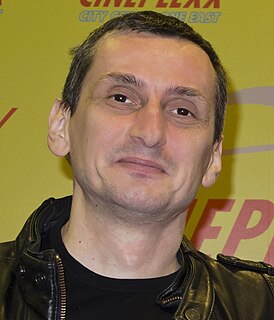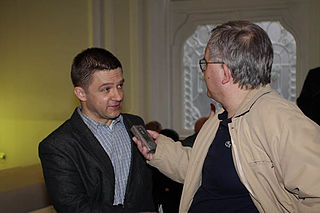
Branko Lustig was a Croatian film producer best known for winning Academy Awards for Best Picture for Schindler's List and Gladiator. He is the only person born in the territory of present-day Croatia to have won two Academy Awards.

Relja Bašić was a Croatian actor, one of the most prolific and versatile Croatian actors with a career which lasted for more than half a century.

The cinema of Croatia has a somewhat shorter tradition than what is common for other Central European countries: the serious beginning of Croatian cinema starts with the rise of the Yugoslavian film industry in the 1940s. Three Croatian feature films were nominated for the Academy Award for Best Foreign Language Film, several of them gained awards at major festivals, and the Croatian contribution in the field of animation is particularly important.
Mirko Norac is a former Croatian general of the Croatian Army (HV), and a convicted war criminal. He was the first Croatian Army general to be found guilty of war crimes by a Croatian court, in 2003, after his case was transferred from The Hague to Zagreb. He was released on probation in November 2011.

Veljko Bulajić is a Montenegrin film director and UNESCO Kalinga Prize recipient. He has spent the majority of his life working in Croatia and is primarily known for directing World War II-themed movies from the Partisan film genre. According to the Croatian Public Broadcasting Company, his films have reached an audience in excess of 500 million viewers worldwide. The top four most viewed Yugoslav films of all time were all directed by Bulajić. MUBI streaming service describes Bulajić as "a creator of made-to-order epic blockbusters".

Branko Bauer was a Croatian film director. He is considered to be the leading figure of classical narrative cinema in Croatian and Yugoslav cinema of the 1950s.

Ognjen Sviličić is a [Yugoslavian]] screenwriter and film director, based in Berlin noted for his critically acclaimed 2007 films Sorry For Kung Fu, Armin and These Are the Rules

Lea Deutsch was a Croatian Jewish child actress who was murdered in the Holocaust.

Full diplomatic relations between Croatia and Israel were established on April 9, 1997 following Croatia's independence from SFR Yugoslavia. Croatia has an embassy in Tel Aviv and honorary consulates in Ashdod, Caesarea, Jerusalem and Kfar Shmaryahu. Israel has an embassy in Zagreb. Relations between the two countries are described as friendly and highly cooperative. In recent years, Croatia and Israel intensified bilateral relations and cooperation in the field of defence and security. Croatia is one of the countries Israel occasionally turns to inside the EU to advocate on its behalf and it generally abstains or votes with Israel on key EU votes at the UN. Israeli president Reuven Rivlin described Croatia in 2019 as "Israel's strong ally in the EU, the UN and other multilateral organizations."

The Zagreb Synagogue was the main place of worship for the Jewish community of Zagreb in modern-day Croatia. It was constructed in 1867 in the Kingdom of Croatia-Slavonia within the Austrian Empire, and was used until it was demolished by the Ustaše fascist authorities in 1941 in the Axis-aligned Independent State of Croatia.

Antonio Nuić is a Bosnian Croatian film director and screenwriter.
House on the Sand is the only feature film directed by Ivan Martinac, one of the key figures of Croatian avant-garde and underground film scene.

The Parade is a 2011 Serbian comedy-drama film, written and directed by Srđan Dragojević and released on 31 October 2011. The film, which deals with LGBT rights issues in Serbia, features footage of the 2010 Belgrade gay pride parade.
Božidarka Frajt is a Croatian actress.

Tvrtko Jakovina is a Croatian historian. Jakovina is a full time professor at the Department of History at the Faculty of Humanities and Social Sciences of the University of Zagreb.

Adolf Müller (1857–1932) was a renowned Croatian industrialist, manufacturer and entrepreneur.

The Show Must Go On is a 2010 Croatian science fiction drama directed and written by Nevio Marasović, starring Sven Medvešek and Nataša Dorčić.

Brcko in Zagreb is a 1917 Croatian short comedy film directed by Arsen Maas.

Hulahop d.o.o. is a Croatian ltd. company working in film production and cultural services. Hulahop was founded in 2006 by Dana Budisavljević and Olinka Vištica coming from the years of experience in producing films in Factum and organizing prominent film festivals in Croatia Motovun Film Festival and ZagrebDox.
The Jewish Cultural Center in Ljubljana was founded in 2013. It is the center of Jewish life and culture in modern-day Slovenia. It was founded by activists with the original aim of promoting and practicing Jewish culture, establishing a museum and a place for prayer, and promoting cultural cooperation between Jews in Slovenia, the diaspora, and Israel. It quickly grabbed the eye of tourists and local authorities. It blends topics of Judaism and history through art, innovation, and creativity. Usual activities of Jewish communities are expanded upon, to include more entertaining, and educational topics through theater and puppet performances, concerts, lectures, large events for Jewish holidays, and other social gatherings. The Jewish Center is home to the first Jewish museum in Slovenia, as well as the first functioning synagogue since the Maribor Synagogue shut down. Ljubljana's Mini teater is the most important partner in the implementation of these programs. Its premises are intended for permanent public events and programs.



















